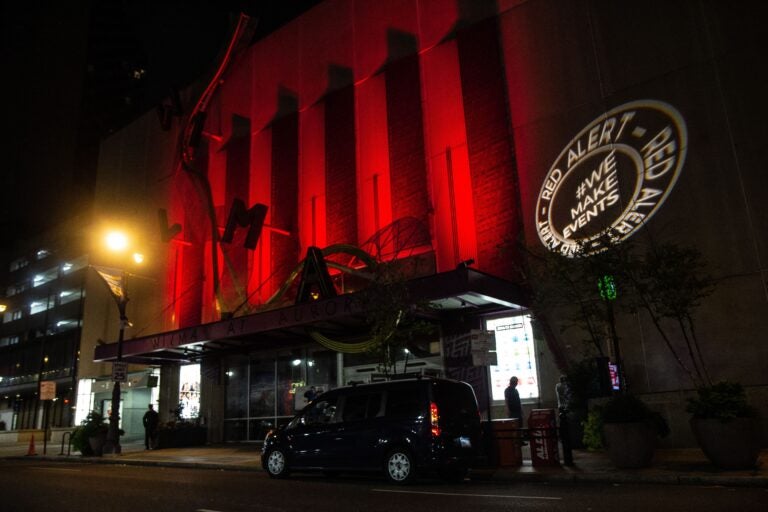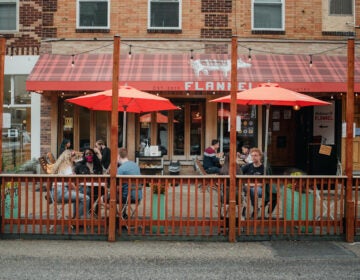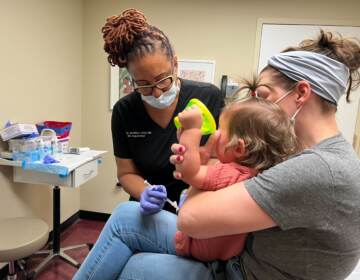Pa. coronavirus recovery: New bill could help struggling performance venues
State Rep. Jake Wheatley has introduced a bill designed to help independent live music venues hit hard financially by the coronavirus pandemic.

The Wilma Theater in Philadelphia lit up red for industry professionals out of work due to the pandemic. (Kimberly Paynter/WHYY)
Updated at 4:55 p.m.
–
New Pa. bill could help struggling performance venues
State Rep. Jake Wheatley has introduced a bill designed to help independent live music venues hit hard financially by the coronavirus pandemic.
If passed, the Save Our States Act will offer $200 million in grants to independent venue operators, theaters and promoters struggling to stay afloat as a result of COVID-19 restrictions on crowd capacities.
The fund would be created by using CARES Act dollars.
“COVID has been detrimental to almost every industry in the Commonwealth, and few have been hit harder than live music venues, especially small independently owned venues. These businesses have experienced and sustained a complete loss in revenue through this health emergency, and there is no end in sight. Accordingly, this industry needs assistance,” said Wheatley in a news release.
Under the SOS Act, eligible grant recipients include those that organize, promote, produce, manage, or host ticketed live concerts, comedy shows, theatrical productions, or other events by paid performing artists.
They must have fewer than 500 full-time employees and cannot be publicly traded companies, own or operate venues in more than one country or more than 10 states, or receive more than 10% of their gross revenue from federal funding.
No grant can be greater than 45% of the venue’s gross revenue from 2019 or $2 million, whichever is less.
The money can be used for a wide range of expenses, including payroll and benefits, rent, utilities, insurance, and personal protective equipment.
“It is critical that we make an effort to preserve this industry, which is a jewel of the Commonwealth’s Cultural Crown,” said Wheatley. “It is also important to assist this industry as it is an important aspect of the live music ecosystem that includes dining and lodging.”
Earlier this month, Gov. Tom Wolf issued new guidelines for crowd sizes in indoor spaces.
For spaces built to hold 2,000 people, the limit is 20% of maximum occupancy. For venues that can hold up to 10,000 people, the limit is 15% of maximum occupancy. For venues that hold over 10,000 people, the limit is 10% of maximum occupancy – up to 3,750 people.
In Philadelphia, indoor theaters and performance spaces can now operate at 10% capacity, with a maximum of 250 people permitted in larger venues.
Pa. experiencing ‘fall resurgence’ of COVID-19
With daily case counts of COVID-19 on the rise, Pennsylvania officials are again urging residents to adhere to the state’s pandemic protocols.
“We need to mask up, wash up and maintain social distancing,” said Health Secretary Dr. Rachel Levine during a Monday news conference.
Pennsylvania has reported more than 1,000 new positive cases of COVID-19 for each of the last 14 days.
Hospitalizations due to COVID-19 are also on the rise and will likely continue to rise if the upsurge in daily case counts continues, said Levine, adding that “everyone needs to take this very seriously.”
Levine attributes the rise in daily case counts to large gatherings, businesses, such as restaurants and bars, as well as relatively small gatherings among family and friends.
The state has now reported more than 180,000 positive cases of COVID-19 since the start of the pandemic.
Statewide, the positivity rate is 4.3% — the highest it’s been since Aug. 7. Nearly a third of Pennsylvania counties are reporting a positivity rate of more than 5%.
DOH Secretary: Program designed to address outbreaks at long-term care facilities is ‘essential’
As Pennsylvania faces a fall resurgence of positive COVID-19 cases, the Department of Human Services is highlighting a program launched to help the state’s most vulnerable residents during the pandemic.
The Regional Response Health Collaborative program provides clinical, operational and educational support to long-term care facilities preparing for or facing outbreaks of COVID-19.
“The unfortunate reality of this pandemic is that an outbreak can and will happen. And an outbreak doesn’t necessarily suggest negligence. These facilities and their staff do not exist in a bubble. What matters most is how we catch and respond to outbreaks when they occur. And the RHC program is undoubtedly strengthening our response at the state level and making local facilities better equipped to respond,” said DHS Secretary Teresa Miller during a virtual news conference.
“This approach is saving lives,” she added.
The program, created by state legislation, operates in six regions through partnerships with 11 health systems. It’s slated to lapse on Dec. 1, but Miller said she hopes it can be extended beyond that end date.
The state is searching for funding to make that possible, said Secretary of Health DR. Rachel Levine.
“This program is essential,” she added.
Approximately 127,000 residents live in 2,000 long-term care facilities across Pennsylvania.

Get daily updates from WHYY News!
WHYY is your source for fact-based, in-depth journalism and information. As a nonprofit organization, we rely on financial support from readers like you. Please give today.





![CoronavirusPandemic_1024x512[1]](https://whyy.org/wp-content/uploads/2020/03/CoronavirusPandemic_1024x5121-300x150.jpg)


